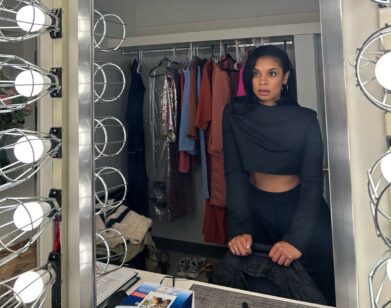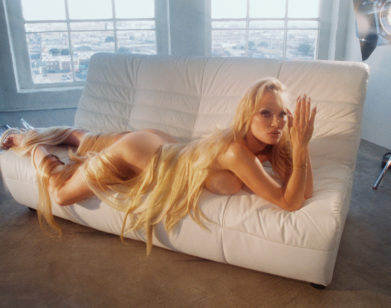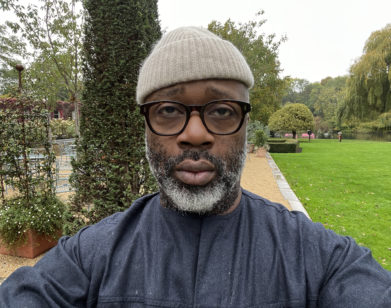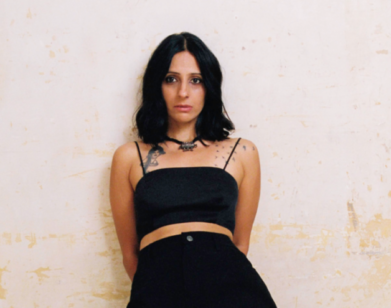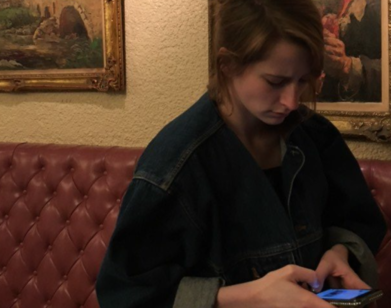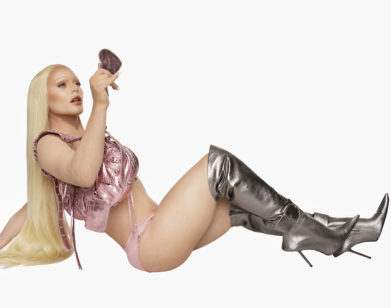Rough Draft
Bolu Babalola is Always Returning to Toni Morrison and bell hooks

Bolu Babalola at her desk.
This is Rough Draft, in which our favorite writers get to the bottom of their own craft. From preferred writing drinks to whether or not you really need to carry a notebook, we find out all the ways they beat writer’s block and do the work. Before curling up Love in Color: Mythical Tales from Around the World, Retold by Bolu Babalola, discover all the elements that helped her get it done.
———
JULIANA UKIOMOGBE: Describe your ideal writing atmosphere. What gets you in the mood?
BOLU BABALOLA: I love that sweet spot where I have figured out plot and scene and I know who my characters are, and they’re just driving the direction and I’m listening to sexy, romantic R&B because I’m situated in the world so deeply that lyrics aren’t a distraction but rather, a motivation, and it is probably around 9 or 10 pm and a few warm lamps are lit and maybe a candle and I am in the zone. That is the ideal writing atmosphere. An adequate one is one where there is lots of natural light, preferably near a window. Music is never far away, even if it means taking a break. I find it loosens my creative muscles, provides a balm, helps create or accentuate the atmosphere, especially for a romantic scene.
UKIOMOGBE: Do you eat or drink while you write? If so, what do you like to have?
BABALOLA: I try not to drink too much coffee because it makes me feel wretched in the long run, and I am British, so of course, tea is a staple. I’m not really a snacker, but if I do, it would probably be a breakfast bar or something. But tea is a must. It’s fuel.
UKIOMOGBE: Do you ever smoke or drink while you write?
BABALOLA: Ha! There is only a very specific scenario in which alcohol is conducive for me and it is within that aforementioned zone, but particularly during a romantic scene or a battle of wit between two leads. The fluidity and playfulness that imbues my mind after a margarita at my favorite coffee shop/bistro near my home definitely help with playful dialogue, and I find it assists in making the conversation feel more natural. It has to be at that café/bistro though. If I have alcohol at home, alone, it is very likely to end with my passing out on my sofa swiftly. Not very efficient.
UKIOMOGBE: Do you keep a notebook or journal?
BABALOLA: I keep one million notebooks. I also have a notes app doc where I write new words I encounter every day with their meanings with the idea that I shall memorize them for my perusal. I never really do, I remember maybe, two at best, but I think the effort means something. Maybe they’re burrowed deep in my mind and I won’t know they’re there until one day I burst out with “cephalopodic” in the right context.
UKIOMOGBE: What’s your favorite quote?
BABALOLA: I have so very many. One of them is, “Where I already am is the mainstream”—Toni Morrison. Psychically powerful to me, a reminder that societal projections are none of my business. My business is telling our stories and living my life.
bell hooks said that “male fantasy is seen as something that can create reality, whereas female fantasy is regarded as pure escape,” and it is a reminder to me to write within the liminal area of fantasy and reality, a place where our wishes aren’t inherently whimsical, where joy and hope can be found and realized.
UKIOMOGBE: Whose writing do you always return to?
BABALOLA: Of course, the aforementioned: Morrison and hooks. I particularly always return to All About Love, just because often, fiction can be difficult for me to read when in a particular bout with my own writing, and All About Love manages to be so lucid and beautifully deep about the subject matter I am often dealing with. I am constantly reading Meg Cabot! Haven’t stopped since I was about 13 or 14. Her stories are always so funny and warm and joyful with extremely smart female leads, and men who are always just so kind. Of course, they are witty and handsome, but also their kindness and heart is something that always stands out about them. Too many times is a hard-nosed man romanticized. I love Zadie Smith‘s essays.
UKIOMOGBE: What books did you read as a kid? Have your thoughts about the writers changed?
BABALOLA: Meg Cabot! Louise Rennison! And they have only changed as far as my appreciation for them has grown. Funny, smart, sharp writing that takes immense intelligence to produce. Rich, developed worlds that never feel overwrought. Light of touch and yet never devoid of emotional depth.
UKIOMOGBE: How many drafts of one piece do you typically write?
BABALOLA: Ha ha ha. No such thing as “typical” for me. It takes however long it wants to take. It’s about the story. If it feels right, it feels right. If it is missing something, it’s missing something. I also never really stop tinkering and deepening.
UKIOMOGBE: What would the title of your memoir be?
BABALOLA: “Sugar, Spice, and Nothing Nice.” Or, “Don’t Tweet This.”
UKIOMOGBE: Who’s your favorite screenwriter? Can a movie ever be as good as the book?
BABALOLA: I will tell you my favorite TV creator, and that is Michael Schur. Funny, warm stories centering love and connection and community and togetherness. Somehow manages to be sweet without being cloying. They can have an edge but they are never truly mean-spirited, and if it does veer close, it is corrected. His shows are so very human, which feels like an odd thing to say as, you know, conceptually, aren’t we all? But I feel like he really nails the beauty and complexity of what makes us human through the prism of joy. I also love This Is Us, created by Dan Fogleman, for the very same reasons. As for the last part of the question—of course they can. As long as it is written and adapted accordingly to the medium. To All The Boys I Loved Before is a flawless adaptation. Also, Nick & Norah’s Infinite Playlist does a fantastic job of it. Oh, and I adore Kirsten Smith, who wrote 10 Things I Hate About You, She’s the Man, and Legally Blonde, among many other things. So funny, so sharp, and with such love for women.
UKIOMOGBE: Do you consider writing to be a spiritual practice?
BABALOLA: Absolutely, but also not at all. I hate over-romanticizing it, because it is still work, and it doesn’t always need to be spiritual—sometimes you just need to get the job done. But I find that often I find myself attuned with who I am and my purpose. I find the work of excavating emotion and dissecting and unfurling it so sacred. I discover so much about myself and also, us as humans in general. I also think it assists in practicing empathy. Empathy is a spiritual practice—it is feeling the humanity of others, acutely. Also, if you believe in god, like I do, creating, in general, can feel spiritual.
UKIOMOGBE: Which writers would you choose to have dinner with, living or dead?
BABALOLA: All my writer friends. They’re so much fun, and they’re extremely smart.
UKIOMOGBE: What advice do you have for people who want to be better writers?
BABALOLA: Write. And read. On loop.
UKIOMOGBE: What are some unconventional techniques you stand by?
BABALOLA: Mind journey breaks! I like to have periods where my mind does whatever it wants. I Google something random, and I follow the path of knowledge, clicking on things and learning things. It really doesn’t have to be anything to do with work—it could be Black Female Rock Musicians in 1950, but I will let myself feed myself in that way. The freedom refreshes the mind but also can open it up, making it easier to write.
UKIOMOGBE: Can great writing save the world?
BABALOLA: I think people can save the world, and I think people with imagination can save the world, because building a better world is dependent on the ability to imagine one. If people who write can contribute to that, if we can offer something that helps to stretch our ideas of hope and possibility, then we are playing a part.

